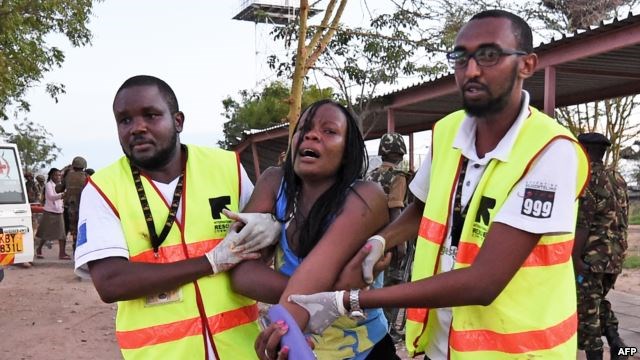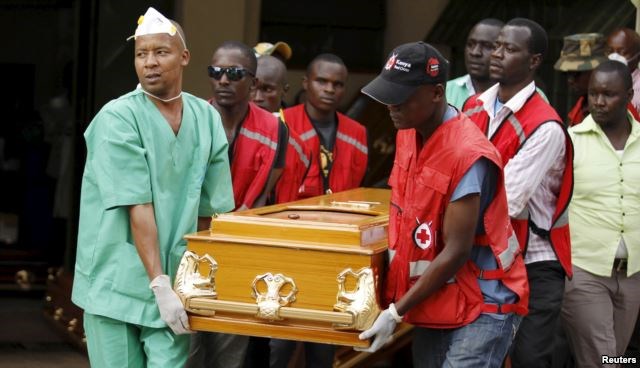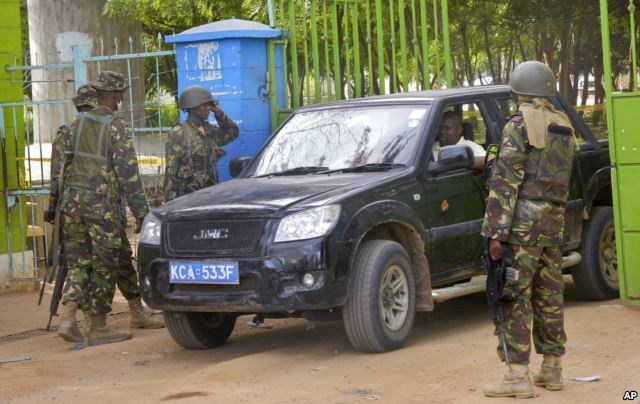
Thursday, March 31, 2016

FILE - Paramedics help a student who was injured during an attack by Somalia's al-Qaida-linked al-Shabab gunmen at Garissa University College, Kenya, April 2, 2015.
NAIROBI, KENYA—This Saturday Kenya will mark the one-year anniversary of the terror attack on Garissa University. Al-Shabab militants killed 148 people there, most of them students. In the past year, Kenya says it has heightened its response capabilities. But the region, and the continent, remain on high alert for further attacks.
On April 2, 2015, four gunmen from the Somali militant group al-Shabab stormed Garissa University in northeastern Kenya.
Twenty-two-year-old Steve Mwangi was there. He hid in a cupboard with three others.
“We hid from seven in the morning to six-thirty in the evening, when a rescue squad came to the hostel. I didn’t think I would get out of that place. When I realized they were killing people and they killed two of my roommates I was like next they will come confirming inside the hostel but, fortunately, they didn’t,” he said.
Mwangi moved off campus and now he commutes. He says he won’t sleep in the dorm in case of another attack.
Al-Shabab militants said they attacked the university as payback for Kenyan military operations in Somalia.
The siege at Garissa went on for at least 12 hours. Militants killed 148 people and wounded dozens more.

FILE - Mortuary workers and Kenya Red Cross volunteers carry the coffin containing the body of Mildred Yondo, a student killed during an attack by gunmen at Garissa University, from the Chiromo Mortuary in the capital Nairobi, April 8, 2015.
Slow response
Kenyan security forces were severely criticized for their slow response. According to local media, it took them at least seven hours to reach the university.
Interior Ministry spokesman Mwenda Njoka told VOA those deficiencies have been addressed.
“With the refurbishment of the helicopters and also the ones being bought, it means our paramilitary are able to move within the fastest time. For instance, the reaction time for Garissa University, everybody admits that we didn’t move as fast as we should have. But if we had the equipment we have now, we could have been able to get troops there within an hour or else,” he said.
Threat remains high
And security analysts say the risk of similar attacks remains high. Homeland security expert Richard Tuta points out that the attack on Garissa, like the more recent spate of A.Q.I.M. attacks on hotels in West Africa, required just a handful of fighters.
“The return will be very high in terms of the numbers of casualties, and the cost of attacking those target is very minimum because they don’t require a lot of preparation. They don’t require a lot of expertise in order to penetrate some of these soft targets,” he said.

FILE - Kenya Defence Forces (KDF) guard the main gate of the Garissa University College compound that was the scene of a recent attack by al-Shabab gunmen, in Garissa, April 6, 2015.
A single attack like Garissa or the deadly three-day siege of Westgate mall in Nairobi in 2013 were propaganda boons for al-Shabab.
When Garissa happened in 2015, it had seemed al-Shabab was on the defensive amid continued pressure from African Union troops in Somalia.
But shortly after, in mid-2015, the balance began to shift. Militants have raided military bases in Somalia, walking away with gear and killing dozens of regional troops in at least two attacks. Al-Shabab has also increased bomb attacks in Somalia.
Some experts believe the al-Qaida affiliate is in a fierce battle for survival as the Islamic State group lures away its fighters and draws new recruits in the region. Observers also note that African terror affiliates are jockeying for funding and influence.
Nairobi-based security expert Andrew Franklin sees more local motivations.
“We are missing on the big picture al-Shabab objective. It's focus for 2016 is on derailing the election schedule in Mogadishu in August 2016. Its objective is to demonstrate that the federal government of Somalia is unable to hold elections," he said.
Since Garissa, Kenya has not seen a major terror attack. But the threat remains, and security experts say African security agencies must work together to stop militant groups and combat the spread of extremist ideology that is radicalizing young people.